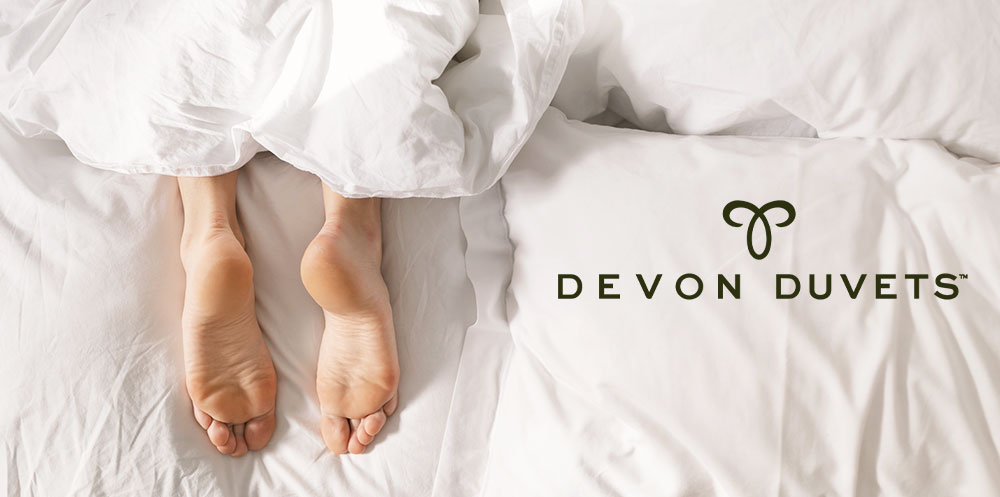Lifestyle tweaks for Restless Legs Syndrome

Restless Legs Syndrome (RLS) can be a debilitating problem, especially when it comes to bedtime. The symptoms include an irresistible urge to move, often accompanied by aching and a pulling or crawling sensation. This is disruptive during the day but often worse at bedtime, making sleep difficult and so you end up feeling tired in the mornings.
There are some lifestyle changes that can help – and this also includes the type of bedding that you use. We’ve put some tips below, based on some recent studies undertaken by health experts.
Move and massage
If you spend a lot of time sitting down, this will exacerbate the sensations felt by this condition, so try to get up and move around.
- Choose an aisle seat if you are in a train or plane and then take advantage of this by moving around. If you are in a car, then make time for stops so you can get out and move around.
- Gently stretch your legs before bedtime, including flexing your ankles to stretch your calf muscles.
- Massage your legs – this is a form of ‘counter stimulation’ to the sensations of RLS.
Review any medications
Speak to your doctor or medical professional.
- Ask them to review any medications you are taking, even those that don’t need a prescription. For example, some allergy (more on this later!) and cold medications, anti-nausea drugs and antidepressants can sometimes exacerbate RLS and so there may be other options you can take in their place.
- If you are pregnant, RLS can be triggered in 35% of pregnancies and is usually a temporary problem. Sometimes this is caused by iron deficiency so ask your doctor to check this. RLS will usually go away once you’ve had your baby.
Be active – but don’t overdo it
Being active is good for your health but with RLS try to avoid any sudden changes in your activity level, such as quitting your usual routine or suddenly starting to train for a marathon. Studies have shown that it is best take it slowly and consistently, and then try to maintain the same amount of activity daily.
Temperature regulation at night
Sudden changes in temperature where you end up feeling too hot or too cold can trigger and/or exacerbate RLS when you are trying to sleep.
- Opt for bedding that is 100% natural and temperature regulating. Feather and down duvets tend to insulate only – and synthetic duvets can trap heat, causing you to overheat if you are already too hot. Wool filled bedding is ideal as it is naturally breathable, moisture wicking and temperature regulating, working with your body to keep to core body temperature balanced throughout the night. Make sure you pair this with 100% natural bedlinen as polycotton blends are not breathable.
- The other great benefit of wool is that it’s naturally resistant to dust mites and the build-up of micro bacteria, hopefully reducing the need for allergy medications associated with treating the symptoms of dust mite allergies.
- Our award-winning, individually handcrafted British wool duvets are made in our Devon workshops and are available in a choice of lightweight or medium weight. For those who especially feel the cold, we also offer an extra warm weight. Our wool is gathered from British farmers and we do not treat our wool with any chemicals – better for you as well as the planet.
Upgrade your sleep habits
In addition to temperature regulating bedding, check you are doing everything to make your sleep the best it can be.
- Try and go to bed at the time each night and get up at the same time every day.
- Finish eating 2 – 3 hours before bedtime, so you have time to digest.
- Keep your bedroom dark and at an ambient temperature of around 16c – 18c.
- Keep devices and TVs out of the bedroom – the light from these will disrupt your sleep.
Avoid caffeine and alcohol
Avoiding these, especially close to bedtime, can help reduce symptoms.
- Caffeine is found in tea, coffee, hot chocolate and energy drinks and can stay in your body for up to 8 hours. Opt for de-caffeinated options or try to ensure you avoid caffeine after lunchtime.
- Alcohol may help you to fall asleep but is disruptive to the deep sleep cycles during the night, causing you to wake up. Your restless legs may bother you even more if this happens.
Eat a healthy diet
Whilst it is important for everyone to have a balanced diet and to eat healthily, if you have RLS the symptoms may worsen if you don’t take care of your diet.
- Some cases of RLS are linked to not having enough iron, and low magnesium can also exacerbate the symptoms.
- Talk to your doctor before taking any iron and/or magnesium supplements.
Always consult your doctor or a medical professional if your symptoms continue.
Ref: Everyday Health


